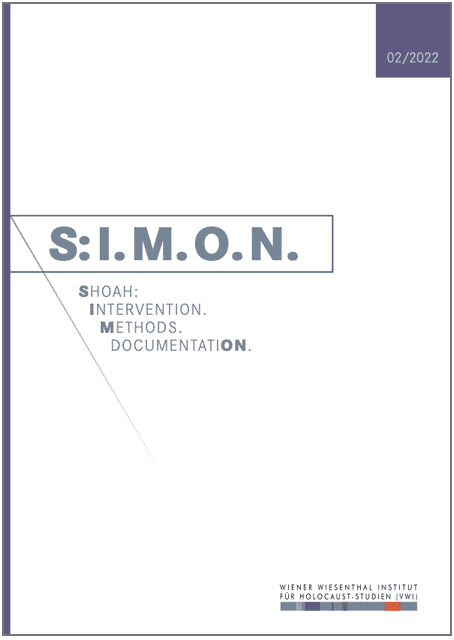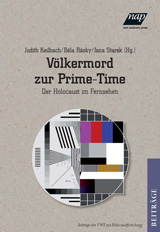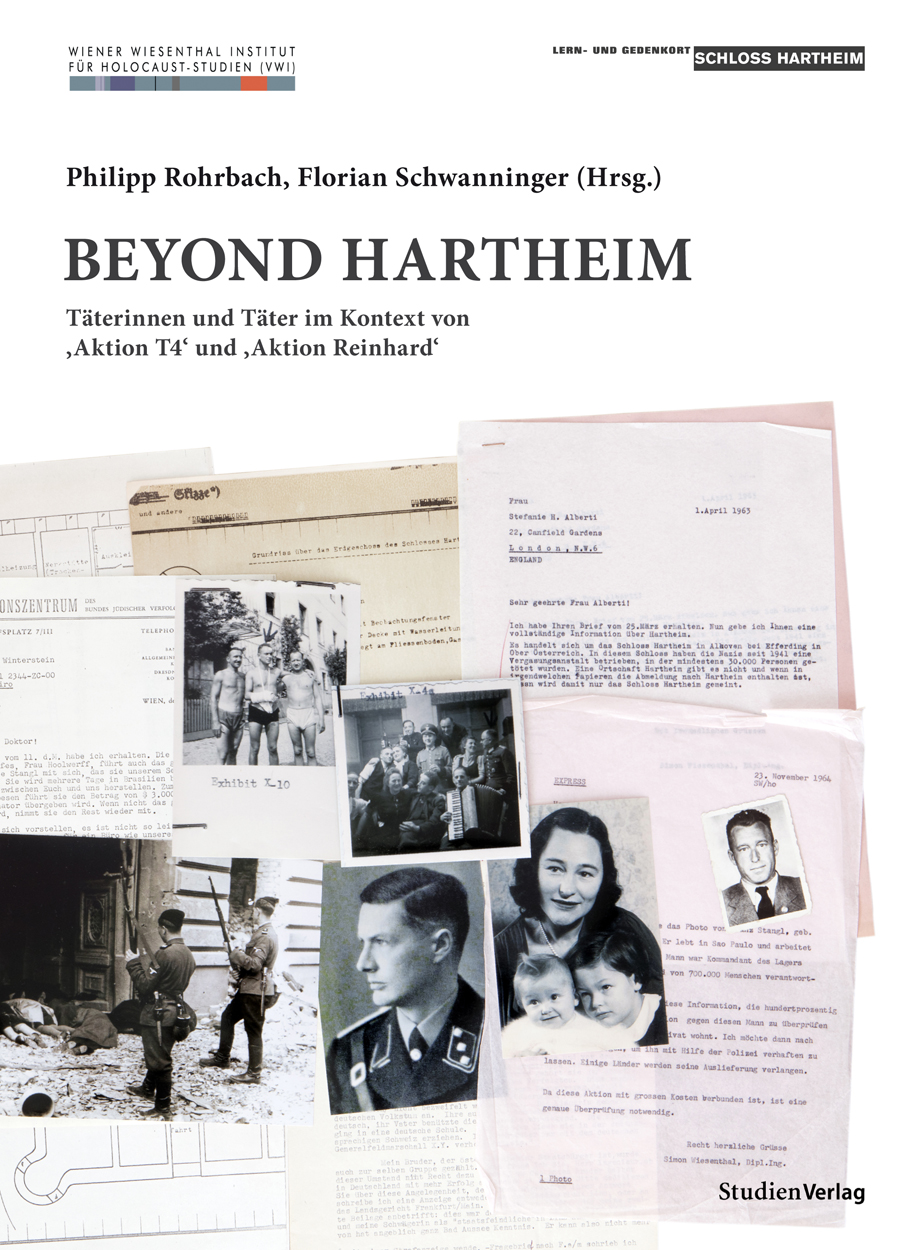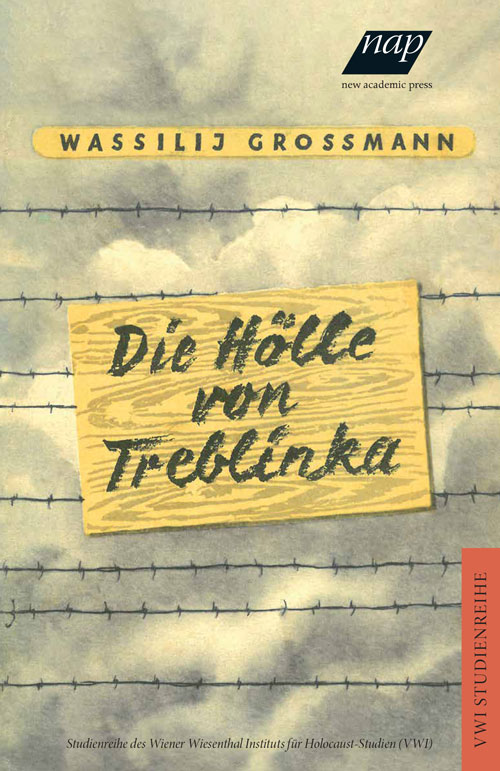News – Events – Calls
| 02. May 2024 18:30 Simon Wiesenthal LectureEdyta Gawron: Never Too Late to Remember, Never Too Late for Justice! Holocaust Research and Commemoration in Contemporary PolandIn 1994, Simon Wiesenthal received a doctorate honoris causa from the Jagiellonian University in Krakow for his lifelong quest for justice – half a century after he had been, for a short time, prisoner of the local Nazi Concentration Camp (KL) Plaszow. The 1990s were the decade when t...Weiterlesen... |
| 07. May 2024 00:00 - 04. June 2024 00:00 WorkshopDealing with Antisemitism in the Past and Present. Scientific Organisations and the State of Research in AustriaThis series of talks, presented by antisemitism experts from different organisations that research antisemitism using a variety of academic approaches, aims to provide a snapshot of historical evolutions, current events, prevalent perceptions and declared (and undeclared) attitudes. I...Weiterlesen... |
| 14. May 2024 08:45 - 16. May 2024 16:30 TagungQuantifying the Holocaust. Classifying, Counting, Modeling: What Contribution to Holocaust History? About the conference: https://quantiholocaust.sciencesconf.org/ Programme timed on the basis of 15-minute presentations + 15-minute discussions; short breaks and lunches Day 1 Tuesday, 14 May 2024Centre Malher (9 rue Malher 75004 Paris/amphi Dupuis) From 8.45 am: Welcome9.30 am...Weiterlesen... |
| 24. May 2024 18:00 InterventionLange Nacht der Forschung 20242024 öffnet das Wiener Wiesenthal Institut für Holocaust-Studien (VWI) in der Langen Nacht der Forschung wieder seine Tore und lädt Interessierte in seine Räumlichkeiten am Rabensteig 3 ein. Im Rahmen von Vorträgen, Podiumsdiskussionen und Präsentationen bieten VWI-Team und Gäste Einb...Weiterlesen... |
| 04. June 2024 13:00 VWI invites/goes to...Workshop: Social History of the Shoah. Everyday Life, Space and Time VWI invites the Department of Contemporary History, University of Vienna 13:00Hannah Riedler (VWI Junior Fellow)Between Deportation, Forced Labour and Germanisation. The Umwandererzentralstelle in Occupied Poland 1939–1941Commented by Kerstin von Lingen 13:40...Weiterlesen... |
| 13. June 2024 18:30 Simon Wiesenthal LectureJack Fairweather: The Trials of Fritz Bauer. How Life as a Gay Jewish Socialist under the Nazis Shaped His Quest for JusticeFritz Bauer’s daring mission to bring Adolf Eichmann and the perpetrators of Auschwitz to justice forced Germany and the world to pay attention to the crimes of the Holocaust. Bauer’s moral courage in speaking out in a society that had not yet come to terms with its past, which he him...Weiterlesen... |
Judith Szapor
Senior Fellow (01/2018–05/2018)
Gender, Race, and the Jewish Family in Hungary after the First World War. Women and the Numerus Clausus 1919–1928
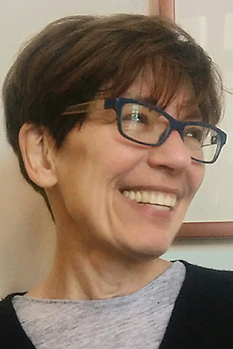 This research project focusses on the impact of the so-called numerus clausus law on young Hungarian Jewish women. Introduced in September 1920, the law limited the admission of Jewish students at Hungarian universities to six per cent, the percentage of Jews in the general population. Jewish women were disproportionally affected as it resulted in a de facto ban on women’s enrolment until 1923 and because of the high ratio of female Jewish students at Hungarian universities until the end of the First World War. The legal and political history of the law – which, by normalising the breach of the principle of equal citizenship, prepared the ground for the Holocaust in Hungary – has been well established.
This research project focusses on the impact of the so-called numerus clausus law on young Hungarian Jewish women. Introduced in September 1920, the law limited the admission of Jewish students at Hungarian universities to six per cent, the percentage of Jews in the general population. Jewish women were disproportionally affected as it resulted in a de facto ban on women’s enrolment until 1923 and because of the high ratio of female Jewish students at Hungarian universities until the end of the First World War. The legal and political history of the law – which, by normalising the breach of the principle of equal citizenship, prepared the ground for the Holocaust in Hungary – has been well established.
Research has also been emerging on the so-called numerus clausus refugees, the Jewish students who left Hungary to study at universities in Austria, Germany, Czechoslovakia, and elsewhere. Yet no study has explored women students’ specific experience or even established their approximate numbers. This project will explore archival and oral history sources to highlight the social and gender history aspects of this phenomenon, including the personal and family strategies involved and the impact on life choices, from marriage to emigration.
Judith Szapor is Assistant Professor of Modern European History at McGill University in Montreal. Her publications include the edited volume (with Andrea Pető, Maura Hametz, and Marina Calloni) Jewish Intellectual Women in Central Europe. Twelve Biographical Essays and the forthcoming monograph Hungarian Women’s Activism in the Wake of the First World War. From Rights to Revanche.
Beate Kutschke
Senior Fellow (10/2018–03/2019)
Music and Heroisation in Austria. New Perspectives on the Process of Coming to Terms with the Holocaust
 Heroisation has been an important element in the process of coming to terms with the Holocaust across the world since 1945. Jewish and non-Jewish helpers and rescuers, as well as the surviving and dead victims of the Holocaust, have been praised as heroes and heroines for seeking to resist the genocide and/or demonstrating high moral spirit in quietly suffering their fate. While historians, sociologists, and psychologists have acknowledged the significance of these heroisations in the shaping of moral identities and political ideologies during and after the Cold War, the role of music in these processes has been neglected thus far. The investigation of Austria-related ‘Holocaust compositions’ – their music, libretti, lyrics, comments, and performance contexts – will elucidate how the large range of heroic expressive elements in music has reflected changing attitudes towards the Holocaust in Austria, a nation that struggled intensely with facing its past involvement in Nazi crimes.
Heroisation has been an important element in the process of coming to terms with the Holocaust across the world since 1945. Jewish and non-Jewish helpers and rescuers, as well as the surviving and dead victims of the Holocaust, have been praised as heroes and heroines for seeking to resist the genocide and/or demonstrating high moral spirit in quietly suffering their fate. While historians, sociologists, and psychologists have acknowledged the significance of these heroisations in the shaping of moral identities and political ideologies during and after the Cold War, the role of music in these processes has been neglected thus far. The investigation of Austria-related ‘Holocaust compositions’ – their music, libretti, lyrics, comments, and performance contexts – will elucidate how the large range of heroic expressive elements in music has reflected changing attitudes towards the Holocaust in Austria, a nation that struggled intensely with facing its past involvement in Nazi crimes.
Beate Kutschke is a research associate at the University of Salzburg. She approaches music history from a culturologically oriented perspective. In addition to other research topics such as music and protest and computer-assisted music analysis, she has published on Holocaust music and music and heroism during the past years. The results from her research at the VWI will contribute to a monograph on music and ‘Holocaust heroisations’.
Daniel Cohen
Senior Fellow (09/2018–12/2018)
‘Philosemitism’ in Post-Holocaust Europe, 1945 to the Present
 European antisemitism did not disappear after the Holocaust: Yet, starting in 1945, various forms of philosophical, theological, political, and cultural ‘philosemitism’ entered mainstream public discourse in Western Europe and in the European Union since its inception. My book is a critical history of the main ‘philosemitic’ tropes through which Jews, Judaism, and Jewishness were positively imagined in the wake of the catastrophe: humanism and antifascism in the late 1940s; philo-Zionism in the 1950s; generational rebellion in the 1960s; trauma and human rights in the 1970s; the rediscovery of ‘Central Europe’ in the 1980s; the resurrection of the dead but ‘cosmopolitan’ Jew in the European Union’s imaginary; and, more disturbingly, the more recent use of ‘philosemitism’ in the name of Judeo-Christian Europe under threat.
European antisemitism did not disappear after the Holocaust: Yet, starting in 1945, various forms of philosophical, theological, political, and cultural ‘philosemitism’ entered mainstream public discourse in Western Europe and in the European Union since its inception. My book is a critical history of the main ‘philosemitic’ tropes through which Jews, Judaism, and Jewishness were positively imagined in the wake of the catastrophe: humanism and antifascism in the late 1940s; philo-Zionism in the 1950s; generational rebellion in the 1960s; trauma and human rights in the 1970s; the rediscovery of ‘Central Europe’ in the 1980s; the resurrection of the dead but ‘cosmopolitan’ Jew in the European Union’s imaginary; and, more disturbingly, the more recent use of ‘philosemitism’ in the name of Judeo-Christian Europe under threat.
G. Daniel Cohen is Associate Professor of History and Jewish Studies at Rice University in Houston, Texas. He specialises in the history of refugees and forced displacement in twentieth-century Europe. He is currently writing a critical history of ‘philosemitism’ in Western Europe since 1945 and in the European Union since its inception.
Gerald J. Steinacher
Senior Fellow (1/2021–6/2021)
Forgive and Forget? The Vatican and the Nuremberg Trials 1945–1955
 The leadership of the Catholic Church, Pope Pius XII and his closest advisors, as well as many cardinals and bishops, were critical of the Nuremberg war crimes trials and the denazification effort after the Second World War. Papal interventions ultimately culminated in demands for a general amnesty. The Vatican tried to derail many initiatives by the Allies (especially the Americans) to bring Nazi perpetrators to justice. Why did the Catholic Church leadership so vigorously oppose the punishment of war crimes through criminal justice? What alternatives did the Vatican and especially the Pope have to deal with guilt and responsibility (concepts of transitional justice)? In the immediate postwar period, many considered Pope Pius XII an outstanding moral authority, and the Catholic Church maintained a powerful position in Southern and Western Europe. Austria and Italy were predominantly Catholic, as was a substantial part of Germany. The position of the Catholic Church on the ‘fair’ punishment of crimes under the previous regimes is therefore particularly important for understanding these societies and the moral tenor of their time.
The leadership of the Catholic Church, Pope Pius XII and his closest advisors, as well as many cardinals and bishops, were critical of the Nuremberg war crimes trials and the denazification effort after the Second World War. Papal interventions ultimately culminated in demands for a general amnesty. The Vatican tried to derail many initiatives by the Allies (especially the Americans) to bring Nazi perpetrators to justice. Why did the Catholic Church leadership so vigorously oppose the punishment of war crimes through criminal justice? What alternatives did the Vatican and especially the Pope have to deal with guilt and responsibility (concepts of transitional justice)? In the immediate postwar period, many considered Pope Pius XII an outstanding moral authority, and the Catholic Church maintained a powerful position in Southern and Western Europe. Austria and Italy were predominantly Catholic, as was a substantial part of Germany. The position of the Catholic Church on the ‘fair’ punishment of crimes under the previous regimes is therefore particularly important for understanding these societies and the moral tenor of their time.
Gerald J. Steinacher is the James A. Rawley Professor of History at the University of Nebraska–Lincoln. He is the author of numerous publications on twentieth-century German, Austrian, and Italian history, most recently Humanitarians at War. The Red Cross in the Shadow of the Holocaust (Oxford 2017) and Nazis on the Run. How Hitler’s Henchmen Fled Justice (Oxford 2011).
E-Mail: This email address is being protected from spambots. You need JavaScript enabled to view it.
Péter Apor
Senior Fellow (03/2022-08/2022)
Antisemitism and Collective Violence in Post-1945 Hungary
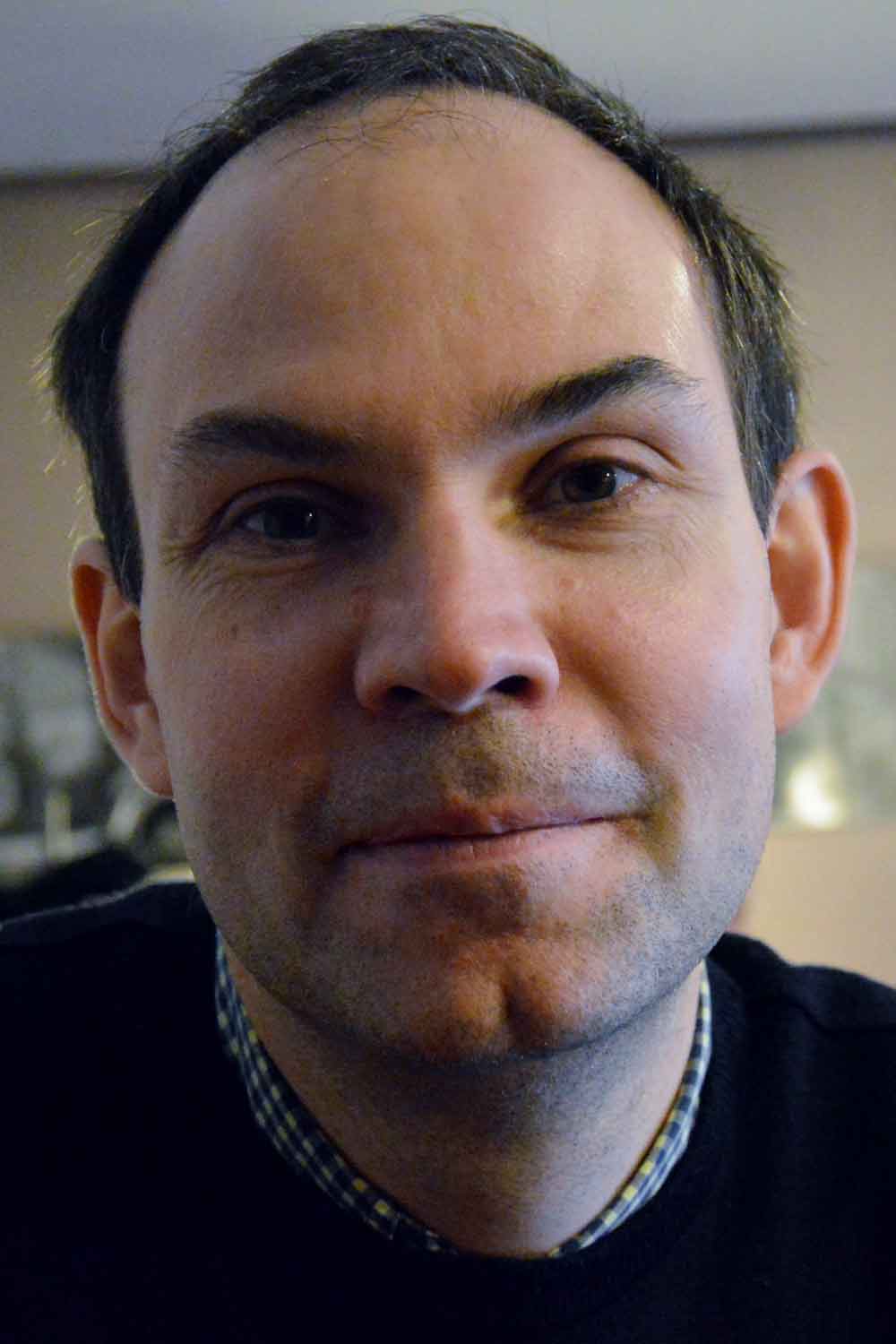 I will explore the genesis and consequences of collective violence committed by workers and peasants in post-WWII Hungary. I will address four sub-themes: 1, the idea of “legitimate violence” in postwar popular cultures; 2, the public image of Jews and the Holocaust after 1945; 3, the popular memory of the war and; 4, the political uses and abuses of the pogroms. This research will help better understand, first, the social and political history of the post-1945 transformation of Eastern Europe and, second, the causes of collective violence, which will render this project relevant for broader social science research, as well.
I will explore the genesis and consequences of collective violence committed by workers and peasants in post-WWII Hungary. I will address four sub-themes: 1, the idea of “legitimate violence” in postwar popular cultures; 2, the public image of Jews and the Holocaust after 1945; 3, the popular memory of the war and; 4, the political uses and abuses of the pogroms. This research will help better understand, first, the social and political history of the post-1945 transformation of Eastern Europe and, second, the causes of collective violence, which will render this project relevant for broader social science research, as well.
Péter Apor is a Senior Research Fellow at the Institute of History of the Hungarian Academy of Sciences. Between 2003 and 2011, Apor was a research fellow at the Central European University (Budapest), and an associate researcher at the University of Exeter. In 2015-2018, he coordinated a comparative research addressing antisemitic pogroms in post-WWII Eastern Europe funded by the Gerda Henkel Stiftung. His main research interest includes the politics of memory and history in post-1945 East-Central Europe, the mechanism of collective violence and ethnic hatred and the history of empires and colonialism in the Cold War. Apor is the co-editor of The Handbook of COURAGE: Cultural Opposition and its Heritage in Eastern Europe, Budapest, 2018. He is the author of Fabricating Authenticity in Soviet Hungary: The Afterlife of the First Hungarian Soviet Republic in the Age of State Socialism, Anthem Press, London, 2014.
E-Mail: This email address is being protected from spambots. You need JavaScript enabled to view it.
Noah Shenker
Senior Fellow (01/2022-07/2022)
Beyond the Era of the Witness: The Digital Afterlife of Holocaust Testimony
 The “era of the witness” marked by a consolidation of survivor memory through film, testimonies, and other media, is giving way to a period when witnesses will no longer be present to anchor representations with their living, moral authority. The USC Shoah Foundation’s Dimensions in Testimony Project (DiT) has tried to address those challenges by using motion-capture technology, intensive interviewing, and database-structured artificial intelligence to create a collection of on-demand virtual, interactive witnesses. In my current book project, we offer scholars, archivists, curators, and others, a framework for interpreting and working with the DiT and other digital representations of the Holocaust. It demonstrates how initiatives like the DiT draw upon a long genealogy of automata and virtual humans. Seen within that historical lineage, the DiT avatars are not only testifying witnesses, but virtual, pedagogical agents that are part of a larger history of interactive learning that often interacts with and is at times subsumed by spectacle.
The “era of the witness” marked by a consolidation of survivor memory through film, testimonies, and other media, is giving way to a period when witnesses will no longer be present to anchor representations with their living, moral authority. The USC Shoah Foundation’s Dimensions in Testimony Project (DiT) has tried to address those challenges by using motion-capture technology, intensive interviewing, and database-structured artificial intelligence to create a collection of on-demand virtual, interactive witnesses. In my current book project, we offer scholars, archivists, curators, and others, a framework for interpreting and working with the DiT and other digital representations of the Holocaust. It demonstrates how initiatives like the DiT draw upon a long genealogy of automata and virtual humans. Seen within that historical lineage, the DiT avatars are not only testifying witnesses, but virtual, pedagogical agents that are part of a larger history of interactive learning that often interacts with and is at times subsumed by spectacle.
Noah Shenker is the 6a Foundation and N. Milgrom Senior Lecturer in Holocaust and Genocide Studies at Monash University’s Australian Centre for Jewish Civilisation in Melbourne, Australia. He is the author of the book Reframing Holocaust Testimony (Indiana University Press, 2015) and of several articles and chapters on topics addressing representations of the Holocaust and other genocides through film, testimony, and new media. He is currently working on Beyond the Era of the Witness: The Digital Afterlife of Holocaust Testimony, a co-authored book with Dan Leopard.
E-Mail: This email address is being protected from spambots. You need JavaScript enabled to view it.
Jacqueline Vansant
Senior Fellow (11/2017–05/2018)
The Extraordinary Correspondence of Jewish-Austrian Classmates 1938-1953
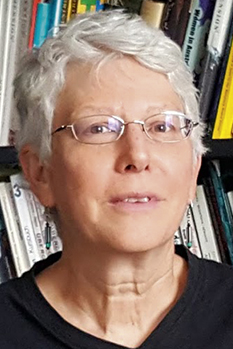 After the National Socialists assumed power in Austria in March 1938, a group of 15- and 16-year-old Jewish schoolboys stood on a bridge in Vienna and said goodbye to each other ‘forever’, not knowing what would become of them or where they would finally land: They promised one another that whatever else happened they would do their best to maintain ties. The boys’ original promise resulted in a group correspondence, or Rundbrief as they called it, that stretched over more than a decade and criss-crossed three continents. This correspondence, which consists of 106 round letters or a total of 675 individual letters, has been housed in the Archive of the History of Austrian Sociology in Graz since 1994.
After the National Socialists assumed power in Austria in March 1938, a group of 15- and 16-year-old Jewish schoolboys stood on a bridge in Vienna and said goodbye to each other ‘forever’, not knowing what would become of them or where they would finally land: They promised one another that whatever else happened they would do their best to maintain ties. The boys’ original promise resulted in a group correspondence, or Rundbrief as they called it, that stretched over more than a decade and criss-crossed three continents. This correspondence, which consists of 106 round letters or a total of 675 individual letters, has been housed in the Archive of the History of Austrian Sociology in Graz since 1994.
Published letters between friends of that age, who experienced the Anschluß, exile, and adjustment to a new environment as teenagers and young adults are rare. The edition of the correspondence will provide readers a unique opportunity to share the experiences and thoughts of this age group, the challenges they faced, and their growth over time. Moreover, the longevity of the correspondence, remarkable in itself, allows us to consider the extent to which the different experiences and environments shaped the boys/young men and their sense of identity.
The planned edition of these letters will contribute significantly to exile, Holocaust, and migration studies, demonstrating how maintaining contact with a peer group from a shared cultural background aided the boys in enduring the trauma of exile and transition from exile to émigré.
Jacqueline Vansant is Professor of German at the University of Michigan-Dearborn. Her publications on Austrian literature and culture after 1945 and in exile include: Against the Horizon. Feminism and Postwar Austrian Women Writers and Reclaiming ‘Heimat’: Trauma and Mourning in Memoirs by Jewish Austrian Réemigrés. Her latest publication in the field of exile studies is Cohesive Epistolary Networks in Exile, in: Helga Schreckenberger (ed.), Networks of Refugees from Nazi Germany. Continuities, Reorientations, and Collaborations in Exile.
Fredrik Lindström
Senior Fellow (02/2018–06/2018)
History and Memory in the Austrian Postwar Period 1960-1988
 The overarching project deals with the “institutional landscape” (Tony Judt) of history writing and memory work in the core period of the Austrian postwar period between 1960 and 1988. Methodologically it relies on Paul Ricœur’s discussion of the interrelationship between the discipline of history and the new field of memory studies, from their common point of origin in the testimony to the representation of the past in historical narratives and public commemorations. The project thus focusses on the formation of different institutional forms of dealing with the past, such as historical commissions, research institutes, and documentation archives.
The overarching project deals with the “institutional landscape” (Tony Judt) of history writing and memory work in the core period of the Austrian postwar period between 1960 and 1988. Methodologically it relies on Paul Ricœur’s discussion of the interrelationship between the discipline of history and the new field of memory studies, from their common point of origin in the testimony to the representation of the past in historical narratives and public commemorations. The project thus focusses on the formation of different institutional forms of dealing with the past, such as historical commissions, research institutes, and documentation archives.
The focus of the research conducted in Vienna in spring 2018 is Simon Wiesenthal’s Documentation Archive of Jews Persecuted by Nazism (1961–2005).
Fredrik Lindström studied History at Lund University and spent a post-doc year at the Institute for Contemporary History at Vienna University. He is currently Senior Lecturer of European Studies at Malmö University and has served for several years as Director of Ph.D. Studies at his home faculty in Malmö.
Natan Sznaider
Senior Fellow (06/2017–08/2017)
Continuity and New Perspectives. Hannah Arendt and the Sociology of Antisemitism
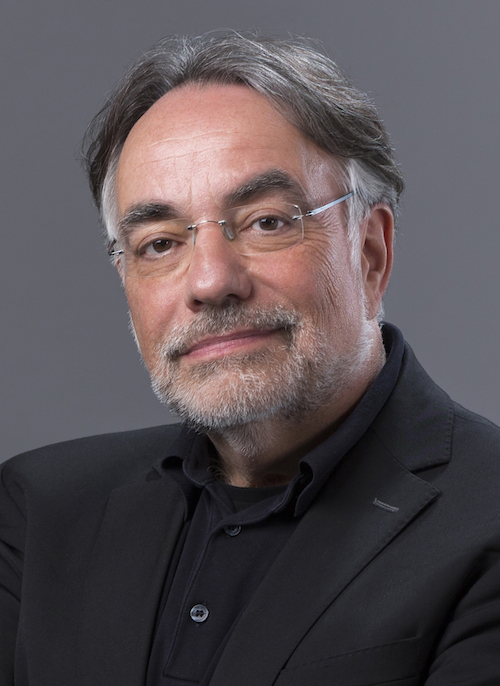 Hannah Arendt was not known as a sociologist, quite on the contrary: She shared many of her Weimar contemporaries’ prejudices against the social sciences and sociology in particular. Yet, a 40,000-word manuscript on antisemitism (only published in 2007 in English translation as part of the edited volume of her Jewish Writings) belongs to her most sociological writings and differs in that respect from her later published and better known writings on the subject. It was originally written in German, during Arendt’s exile in France, probably in the latter part of the 1930s. The essay begins with a historical analysis of Jewish existence in Europe, criticising assimilation and Zionism on equal terms. Arendt set the emergence of modern antisemitism – rejecting the essentialisation of antisemitism by historicising it – in a class struggle between the German aristocracy and bourgeoisie, which she identifies with the emerging nation state.
Hannah Arendt was not known as a sociologist, quite on the contrary: She shared many of her Weimar contemporaries’ prejudices against the social sciences and sociology in particular. Yet, a 40,000-word manuscript on antisemitism (only published in 2007 in English translation as part of the edited volume of her Jewish Writings) belongs to her most sociological writings and differs in that respect from her later published and better known writings on the subject. It was originally written in German, during Arendt’s exile in France, probably in the latter part of the 1930s. The essay begins with a historical analysis of Jewish existence in Europe, criticising assimilation and Zionism on equal terms. Arendt set the emergence of modern antisemitism – rejecting the essentialisation of antisemitism by historicising it – in a class struggle between the German aristocracy and bourgeoisie, which she identifies with the emerging nation state.
From here, one can argue in more general terms that the overarching conservative fear was that the upper social classes, who were the capstone of society’s arch, were being infiltrated by outsiders whose only distinguishing characteristic was their possession of money. Incapable of understanding the laws of deference that held society together, these newcomers would thus undermine and destroy it from within. This longing for a past in which personal relations were more authentic paints the desire for money as inauthentic by contrast. If society is thought of as once being held together by personal bonds, then money can only be cast in the role of a depersonalising agent, and thus as an agent of dehumanisation. Despite this apparent paradox, however, it was all too easy to personalise this supposed agent of depersonalisation. Conservatives constantly railed against the socially climbing bourgeoisie. The identification of the Jews with money, which Marx himself mulled over in his essay On the Jewish Question, is an all too well-known trope.
Thus, beginning with Arendt’s theory of antisemitism, a larger framework of modernity and antisemitism can be developed.
Natan Sznaider was born as a child of Polish – and after the Second World War stateless – survivors of the Shoah in Germany. As an adult, he moved to Israel. He is professor of sociology at the Academic College of Tel Aviv-Yaffo. In 2016, he taught at the Ludwig Maximilian University in Munich. His research focusses on cultural memory in Europe, Israel, and Latin America.
His publications include: Memory and Forgetting in the Post-Holocaust Era. The Ethics of Never Again (together with Alejandro Baer), London 2017; Herzl reloaded. Kein Märchen, Frankfurt/Main 2016 (together with Doron Rabinovici); Gedächtnisraum Europa: Die Visionen des europäischen Kosmopolitismus. Eine jüdische Perspektive, Bielefeld 2008; Holocaust and Memory in the Global Age, Philadelphia 2006; as well as Gesellschaften in Israel – Eine Einführung in zehn Bildern, Frankfurt/Main (forthcoming).
Senior Fellowships 2017/2018 at the Vienna Wiesenthal Institute for Holocaust Studies (VWI)
The Vienna Wiesenthal Institute for Holocaust Studies (VWI) invites applications for its senior fellowships for the academic year 2017/2018.
The VWI is an academic institution dedicated to the study and documentation of antisemitism, racism and the Holocaust. Conceived and established during Simon Wiesenthal’s lifetime, the VWI receives funding from the Austrian Ministry of Science, Research and Economy as well as the City of Vienna. Research at the institute focuses on the Holocaust in its European context, including its antecedents and its aftermath.
Distinguished scholars who have completed their Ph.D.s, have produced works of scholarship and have long-standing experience working at universities or academic institutions are eligible to apply for a senior fellowship. Senior fellows will be able to conduct research on a topic of their choice in the field of Holocaust studies at the institute. Beyond the research work itself, the stay at the institute is intended to encourage communication and scientific exchange among the fellows at the institute. Senior fellows are expected to support the institutes’s academic work and provide research advice and support to Junior fellows. Senior fellows are further expected to contribute to the academic culture of Vienna, e.g., by giving guest lectures and seminars at academic institutions. Senior fellows must be regularly present at the VWI.
Research projects are to focus on a topic relevant to the research interests of the VWI. Within this parameter, applicants are free to choose their own topic, approach and methodology. Fellows will have access to the archives of the institute. It is expected that fellows will make use of relevant resources from the collection in their research projects. Research results will be the subject of formal fellows' discussions and will be presented to the wider public at regular intervals. At the end of their stay, fellows are required to submit a short research paper which will be peer-reviewed and published in VWI‘s e-journal S:I.M.O.N. – Shoah: Intervention. Methods. Documentation.
Senior fellowships are awarded for a duration of between six and eleven months. Fellows will have a work station with computer and internet access and will receive a monthly stipend of € 2,500. In addition, VWI will cover housing costs during the fellowship (up to € 800) as well as the costs of a round-trip to and from Vienna (coach class airfare or 2nd class train fare). There is an additional one-off payment of € 500 available for research conducted outside of Vienna or photocopying costs outside of the institute, where applicable.
Senior fellows will be selected by the International Academic Advisory Board of the VWI.
Applications may be submitted in English or German and must include the following documents:
- completed application form,
- a detailed description of the research project, including the research objectives, an overview of existing research on the topic and methodology (12,000 characters max.)
- a list of publications and a CV with a photo (optional).
Please send your application in electronic format (if possible in one integral *.pdf-file) with the subject header "VWI Research Fellowships 2017/2018" and submit it by 29 January 2017 to:
This email address is being protected from spambots. You need JavaScript enabled to view it.
If you do not get confirmation that we have received your proposal, please contact us.
Future senior fellows are advised to endeavour to finance a part of their fellowship via a stipend from the Stipendienstiftung der Republik Österreich and to submit an application to this end after they have received notification of being awarded their fellowship.
Senior Fellowships 2018/2019 at the Vienna Wiesenthal Institute for Holocaust Studies (VWI)
The Vienna Wiesenthal Institute for Holocaust Studies (VWI) invites applications for its senior fellowships for the academic year 2018/2019.
The VWI is an academic institution dedicated to the study and documentation of antisemitism, racism, nationalism and the Holocaust. Conceived and established during Simon Wiesenthal’s lifetime, the VWI receives funding from the Austrian Ministry of Science, Research and Economy as well as the City of Vienna. Research at the institute focuses on the Holocaust in its European context, including its antecedents and its aftermath.
Distinguished scholars who have completed their Ph.D.s, have produced works of scholarship and have long-standing experience working at universities or academic institutions are eligible to apply for a senior fellowship. Senior fellows will be able to conduct research on a topic of their choice in the field of Holocaust studies at the institute. Beyond the research work itself, the stay at the institute is intended to encourage communication and scientific exchange among the fellows at the institute. Senior fellows are expected to support the institutes’s academic work and provide research advice and support to Junior fellows. Senior fellows are further expected to contribute to the academic culture of Vienna, e.g., by giving guest lectures and seminars at academic institutions. Senior fellows must be regularly present at the VWI.
Research projects are to focus on a topic relevant to the research interests of the VWI. Within this parameter, applicants are free to choose their own topic, approach and methodology. Fellows will have access to the archives of the institute. It is expected that fellows will make use of relevant resources from the collection in their research projects. Research results will be the subject of formal fellows' discussions and will be presented to the wider public at regular intervals. At the end of their stay, fellows are required to submit a short research paper which will be peer-reviewed and published in VWI‘s e-journal S:I.M.O.N. – Shoah: Intervention. Methods. Documentation.
Senior fellowships are awarded for a duration of between six and eleven months. Fellows will have a work station with computer and internet access and will receive a monthly stipend of € 2,500. In addition, VWI will cover housing costs during the fellowship (up to € 700) as well as the costs of a round-trip to and from Vienna (coach class airfare or 2nd class train fare). There is an additional one-off payment of € 500 available for research conducted outside of Vienna or photocopying costs outside of the institute, where applicable.
Senior fellows will be selected by the International Academic Advisory Board of the VWI.
Applications may be submitted in English or German and must include the following documents:
- completed application form,
- a detailed description of the research project, including the research objectives, an overview of existing research on the topic and methodology (12,000 characters max.)
- a list of publications and a CV with a photo (optional).
Please send your application in electronic format (if possible in one integral *.pdf-file) with the subject header "VWI Research Fellowships 2018/2019" and submit it by 31 January 2018 to:
This email address is being protected from spambots. You need JavaScript enabled to view it.
If you do not get confirmation that we have received your proposal, please contact us.
Future senior fellows are advised to endeavour to finance a part of their fellowship via a stipend from the Stipendienstiftung der Republik Österreich and to submit an application to this end after they have received notification of being awarded their fellowship.






